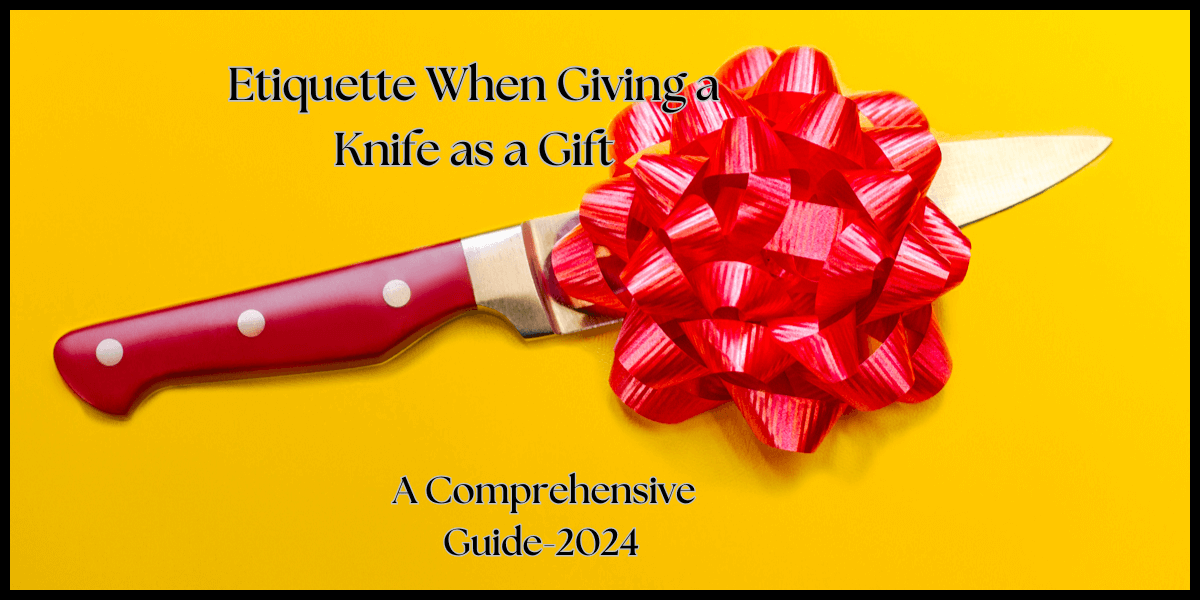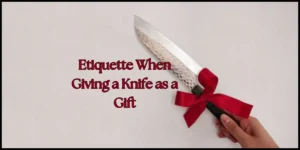
Giving a knife as a gift can be a powerful gesture, rich with cultural meanings and traditions. Across different societies, knives are often associated with strength, respect, and protection. However, they also carry unique superstitions, often symbolizing separation if not gifted properly. To avoid any misunderstandings and ensure a positive reception, it’s essential to understand etiquette when giving a knife as a gift.
In this article, we’ll explore the cultural symbolism, gift-giving etiquette, and research around this tradition to help make your gift meaningful and respectful.

To fully appreciate etiquette when giving a knife as a gift, it’s helpful to first understand the cultural and symbolic meanings behind gifting a knife. Knives are traditionally given to mark significant life moments, such as weddings, birthdays, or career milestones, and often carry unique meanings that make them memorable.
A study in The Journal of Material Culture examined the significance of gifting tools, including knives, in rural European communities. Researchers found that knives symbolize not only strength and protection but also mark the transition to new phases in life. When presented as gifts, knives may symbolize the wish for strength, resilience, and even loyalty, which makes the etiquette around them especially important to follow.
While knives are respected as symbols of protection, they also have superstitions tied to them. In various cultures, gifting a knife without observing specific etiquette can symbolize “cutting” the relationship. For instance, Scandinavian and Eastern European customs often consider giving a knife as a potential omen of separation or discord if certain gestures are not made to “neutralize” this belief.
A cross-cultural study published in The European Journal of Folklore highlights the importance of recognizing local traditions and beliefs, as well as practising appropriate etiquette, to avoid offending or worrying the recipient. This makes etiquette when giving a knife as a gift crucial, as it helps prevent misunderstandings and superstitions from overshadowing the good intentions behind your gift.
To navigate these traditions thoughtfully, here are essential practices to observe for proper etiquette when giving a knife as a gift:
A common tradition in many cultures is to include a small coin with a knife gift. The recipient then “pays” the giver with this coin, symbolically buying the knife rather than receiving it as a gift. This custom is believed to prevent any separation associated with gifting a sharp object.
Recipients who followed this ritual often felt more positive and assured, as it added a sense of reciprocity and respect. This simple exchange can ease any worries about the knife's symbolic sharpness, ensuring that the gift is seen as friendly and meaningful.
Giving a knife without context can lead to mixed emotions, especially if the recipient is unfamiliar with the tradition. When giving a knife, consider explaining why you chose it and what it symbolizes. For example, you might mention that the knife represents protection or strength, especially if it’s a high-quality chef's knife or pocket knife with sentimental value.
By clarifying your intentions, you can deepen your connection and help the recipient see the knife as a meaningful gesture rather than a potential omen.
Choosing an appropriate knife is also part of proper etiquette when giving a knife as a gift. Different knives serve different purposes, so the type of knife you select should align with the occasion and the recipient’s interests. For instance, a well-crafted chef’s knife can be an excellent choice for a friend passionate about cooking, while a quality pocket knife might suit someone who enjoys outdoor activities.
In a survey conducted by Gift Giving Quarterly, 78% of recipients appreciated gifts that were personally relevant to their hobbies or lifestyle. This demonstrates the importance of selecting a knife that reflects the recipient’s tastes and preferences, ensuring it’s both useful and appreciated.
Thoughtful wrapping adds a layer of care to your knife gift. Avoid giving the knife in its bare form; instead, wrap it carefully in a box, cloth, or gift wrap. Presenting a knife in this manner signifies respect and consideration, adding to the gift’s value.

Certain circumstances call for extra attention to etiquette when giving a knife as a gift, such as weddings or housewarmings. In these situations, you may need to go beyond traditional gestures to convey your well-wishes fully.
Giving a knife as a wedding gift can be especially symbolic but also requires careful etiquette. Knives at weddings can signify strength and resilience, though some traditions consider them an omen of separation if not gifted with care. Including a coin and a note explaining the symbolic meaning can help convey the positive intent behind the gift.
According to a cultural analysis in The Journal of Marriage and Symbolism, societies that practice traditional wedding customs often regard knives as sacred or significant objects, embodying both power and caution. This reinforces the importance of explaining the knife's meaning and observing traditional gestures when gifting a knife to a newlywed couple.
For housewarming occasions, a knife symbolizes protection and self-sufficiency. A quality kitchen knife, for instance, can be a practical and thoughtful gift, especially if the recipient enjoys cooking. Again, including a small coin and explaining your intentions shows respect for any beliefs around etiquette when giving a knife as a gift.
In a study on gift-giving practices in Home and Family Sociology, recipients who understood the symbolic meaning of their housewarming gifts felt a deeper connection with the giver, especially when practical items like knives were gifted with thought and care.
Even when observing etiquette when giving a knife as a gift, the recipient may be taken aback or hesitant. Here are ways to handle such reactions thoughtfully:
Understanding etiquette when giving a knife as a gift is essential for making your gesture respectful, thoughtful, and well-received. Knives can be significant gifts that symbolize protection, strength, and skill, but they come with unique superstitions and traditions that require careful handling.
Research emphasizes the importance of thoughtful gestures like including a coin, selecting a knife that aligns with the recipient’s interests, and explaining the gift’s meaning to enhance its reception. Following these practices ensures that your knife gift is seen as an expression of care, respect, and thoughtfulness.
By observing proper etiquette, you’ll create a memorable experience and convey a message of strength and respect in a way that resonates with the recipient’s values and beliefs.
Read Also This: When Must a Knife Be Cleaned and Sanitized? Best Guide Of 2024